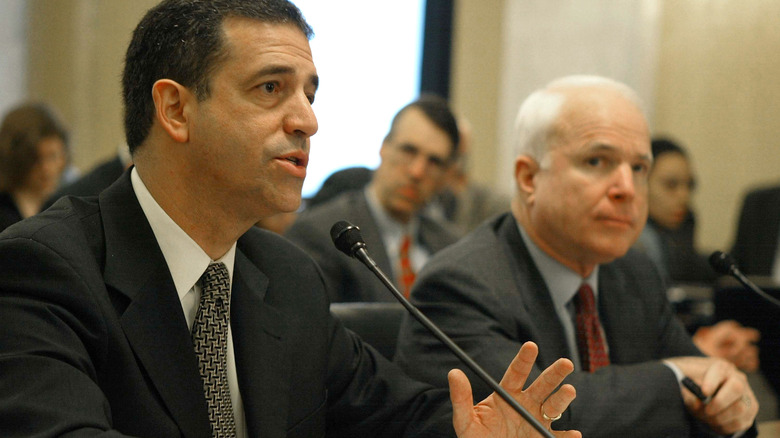The Real Reason Political Commercials End With 'I Approve This Message'
Every election cycle there's a seeming barrage of political ads across legacy media, and at the end of each one, the candidate gives their name and then says, "I approve this message." That tagline is actually mandated by federal election law. This law was passed in the 2002 Bipartisan Campaign Reform Act — also known as the McCain-Feingold Act — as part of the "Stand By Your Ad" provision included in the legislation. Introduced by then-Senators John McCain and Russell D. Feingold, the Campaign Reform Act was intended to reform campaign financing, just as it sounds. Meanwhile, "Stand By Your Ad" was meant to cut down on nastiness and misinformation in political advertising, The New York Times reports. The thinking was that if a political candidate had to appear saying or be heard clearly stating they approved the ad's content, there'd be more truthfulness and less negativity in political advertising.
But as research from the Haas School of Business at the University of California, Berkeley and New York University's Stern School of Business suggests, "Stand by Your Ad" didn't work as intended (via EurekaAlert!). What a study published in 2018 in the Journal of Marketing Research found was that rather than minimize negative political advertising, the tagline made policy-based mudslinging seem more legitimate, while it otherwise failed to influence how audiences perceived ad hominem political attacks or a candidate's overall nasty tone.
Negative ads got worse
Not only did "Stand by Your Ad" fail to sway how viewers saw political advertising and actually make policy-oriented attack ads seem more valid, the percentage of negative advertising aimed at the other candidate actually increased after McCain-Feingold passed. In 2012, 64% of political advertising was considered negative, up significantly from 2000, two years before this campaign reform became law. And according to CNN, during the 2016 presidential election season, a whopping 92% of all political advertising was negative or focused on the other candidate. Meanwhile, in 2018, The Times reported negative ads were up 62% from the last midterm cycle, according to the Wesleyan Media Project. "Stand by Your Ad" didn't directly cause that to happen, but it's clear that it didn't seem to help.
Furthermore, research showed that "I approve this message" at the end of an ad actually improved the viewer's opinion of a candidate regardless of the pitch of the advertising. Berkeley Associate Professor Clayton Critcher, who was involved in the "I approve this message" study, told EurekaAlert!, "We initially thought the boost came from what sounded like an implicit promise of the ads' truthfulness — with the candidate putting themselves and their credibility on the line by affirming that they 'approved' the message."
But while that played a part, "... the bigger effect was the fact that the ad had been touched by regulation. That gave a legitimating halo to the message as a whole," he added. Critcher and his colleagues endorsed a more generic message of just the candidate's name and the office they're running for, instead.
How the statement appears in ads is highly regulated
Despite those mixed results, "I approve this message" will likely be a part of American political rhetoric for years to come. Moreover, not only is the statement mandated, but how it gets included in advertising is highly regulated by the Federal Election Commission (FEC). Per the FEC, "I approve this message" must be "clearly and conspicuously" presented in all print and terrestrial media, such as broadcast TV and radio, as well as cable and satellite broadcasts. Not only is when, where, and how the statement appears regulated, the candidate must also either be seen in full speaking the words, or if not, heard in voiceover along with a photograph of the candidate, "... occupying no less than 80 percent of the vertical screen height," the FEC states.
Notably, it's not required on websites, in emails, or on social media. In 2018, Wiley Law said the FEC regulated certain kinds of political advertising on social media, but that oversight related to ad-financing disclosure rather than content like "I approve this message." And in 2023, Congress introduced the "Honest Ads Act" amidst ongoing debate over updated rules for political advertising on social media.
All the same, in 2018, UC Berkeley researcher Clayton Critcher told EurekaAlert!, " ... We now know that despite the law, there has been no slowdown, and in fact an escalation, in negative political advertising."


